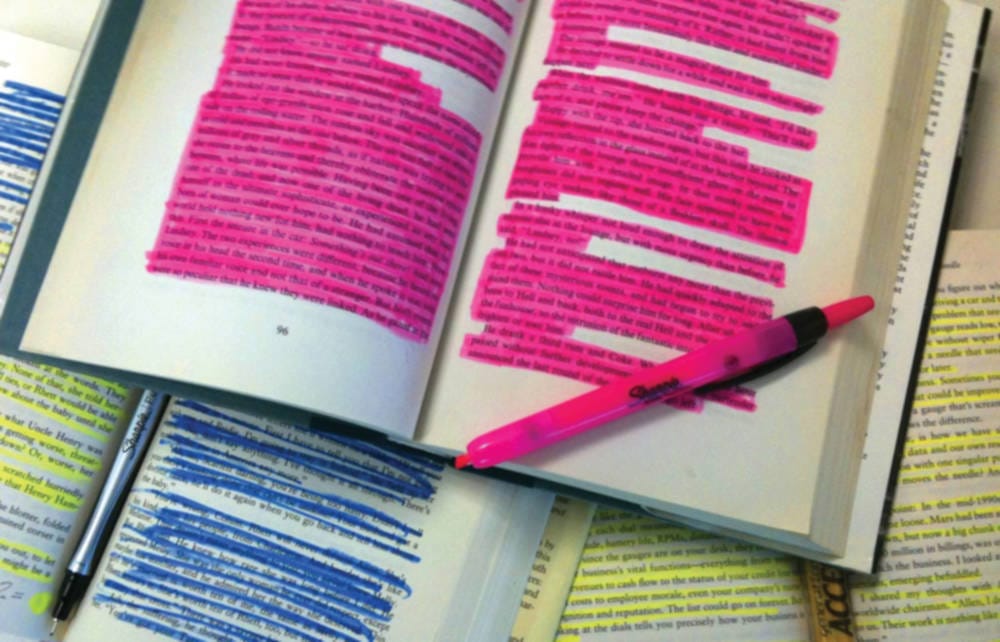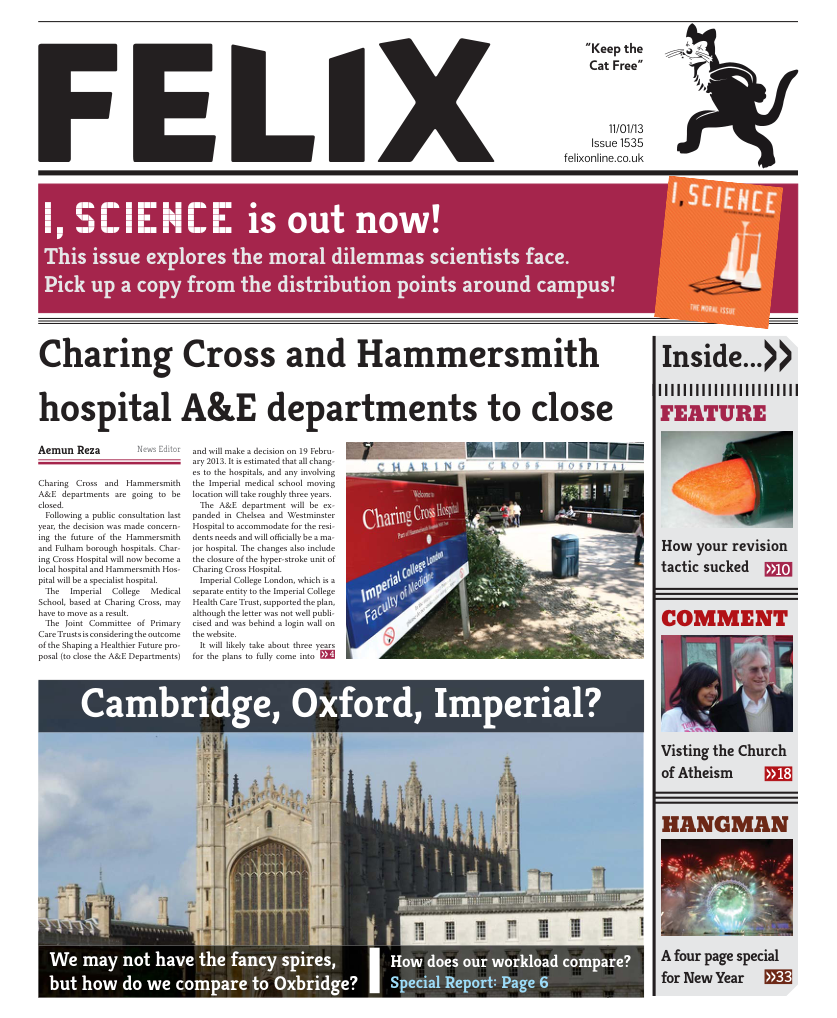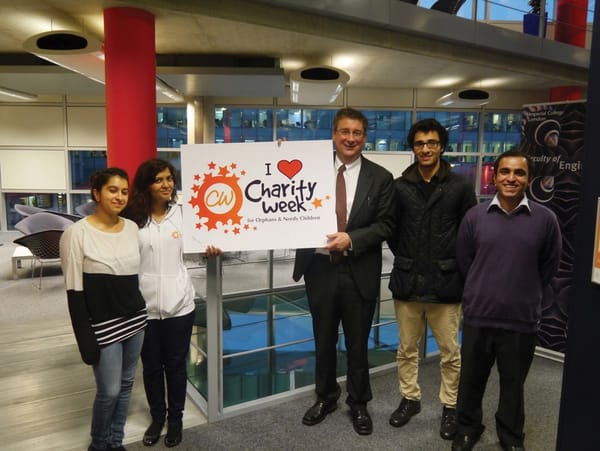Highlight EVERYTHING
Caroline Wood on The Good, The Bad and The Ugly of studying

This week many of you will have been camping out in the Library preparing for exams. (I feel your pain.) This is the first time in 4 years that I am not sitting exams this January (fist punch) and so instead of frantic cramming I’ve taken some time to look into some of the best, and the worst, revision techniques. (Once a nerd...)
It’s two days before your first exam.As the last minute panic starts to set in, what is your weapon of choice for ensuring you get the content from those last few lecture slides off of the page and into your head? Many of us are guilty of turning to the trusty highlighter. Bland lecture notes are transformed into a sea of fluorescent yellow, green and pink as we pray that the technicolour page will imprint itself on our minds. The hope is this can then jump from our head to the exam paper. However, in new research published this Wednesday by the Association for Psychological Science (and reported on by TIME magazine), it has now been proved that highlighting is one of the most ineffective methods of study for most people. (I could have told you that based on my 2nd year exam results, but now it’s “scientifically proven” and “all official”.)
To all those serial highlighting offenders out there: read on to find out how to go from cramming zero to cramming hero. This is a guide to thegood, the bad and the ugly of studying techniques.
The Good
You envy the person who takes revisionin their stride. (Or maybe you are that person, in which case – congratulations!) But with these few tips you should breeze through your studies like you are as cool as Vanilla Ice (baby).
The study reports that there is a “cheats” way of learning very large quantities of challenging material in a very short time. A method never before known outside the psychology lab has now been revealed.
OK, I just made that up. Sorry. In reality, the result of the study is underwhelmingly expected. One of the most effective methods reported is called “distributed practice”. Basically this is a fancy term that means studying over a long period of term. Yep, covering lecture notes during the term and then re-covering them at regular intervals has been proved to be one of the most effective methods of study. Cramming gets a big thumbs down. Hardly surprising.
But wait a second. Before you start heading over to your tutor’s office to quit your degree, there is a dim light at the end of the gloomy studying tunnel. The second best learning strategy is what the authors call “practice testing”. This means that recalling information from memory is conducive to learning. Effectively, all those past papers are actually worth while! Yesss!
Another method that can help “practice testing” is the use of flashcards –as you are forced to recall information from memory. And in yet more good news, if getting all arts and crafts and making flash cards is not your style you’ll be pleased to hear that there are now digital app versions of flash cards such as Quizlet, StudyBlue and FlashCardMachine. Pretty sweet.
The Bad
You know the bad already. You just don’t want to admit that you know. I’ll make it short and painless. Things not to do when studying:
- Reading
- Underlining
- Re-reading
- Highlighting
- Summarising
Of course these methods may work for some people. But in general, highlighting can draw you attention to specific facts and decrease your ability to draw connections between different areas. Reading, I assume, can be good for some people. However half reading, half day-dreaming about what you’re going to do after exams have finished is probably not ideal. It may be a bit surprising that summarising is on this list of what not to do. An often endorsed method is shunned by the authors of the report as they claim that there are more effective ways to best utilise study time. You got told.
The Ugly
To say these techniques are ugly is slightly misleading. They are actually the techniques that are not especially effective, but not completely crap. But the good, the bad and the medium doesn’t have quite the same ring to it so here goes: the ugly.
Visual learning or using mental imagery has been dubbed ‘alright’. It can be effective but it’s also quite time consuming and is, of course, only useful for things you can visualise. Wave goodbye to this method for your quantum modules...
Elaborative interrogation is another complex term used that has quite a simple meaning: question everything. Continuously ask yourself ‘why’ questions as you study so you check you understand where everything comes from. This sounds great in theory. However the likely outcome is that you will discover you have no idea why you assume x is positive and subsequently realise you don’t even know what x represents before deciding to “just accept it”.

Self-explanation, or forcing yourself to explain the text in detail instead of passively reading it over can be good. This comes with a caution: effectiveness depends on how complete and accurate your explanations are. Highrisk – high reward strategy?
Finally, the keyword mnemonic. You associate new vocabulary with other words in imaginative ways. For example when learning the French word for key, “la clef,” you can imagine a key on top of a cliff. (Example curtesy of TIME magazine.) Good luck associating something with “macromolecular structure determination by X-ray crystallography or solution nuclear magnetic resonance spectroscopy”.
Most of these techniques require a high time:learning ratio. They can be effective but when you have 8 modules to learn in 8 days they are pretty much a no go.
So there you have it. Two tips to exam success! Go over your lecture notes and give flashcards a chance. Happy revision and good luck if you still have exams this January!









